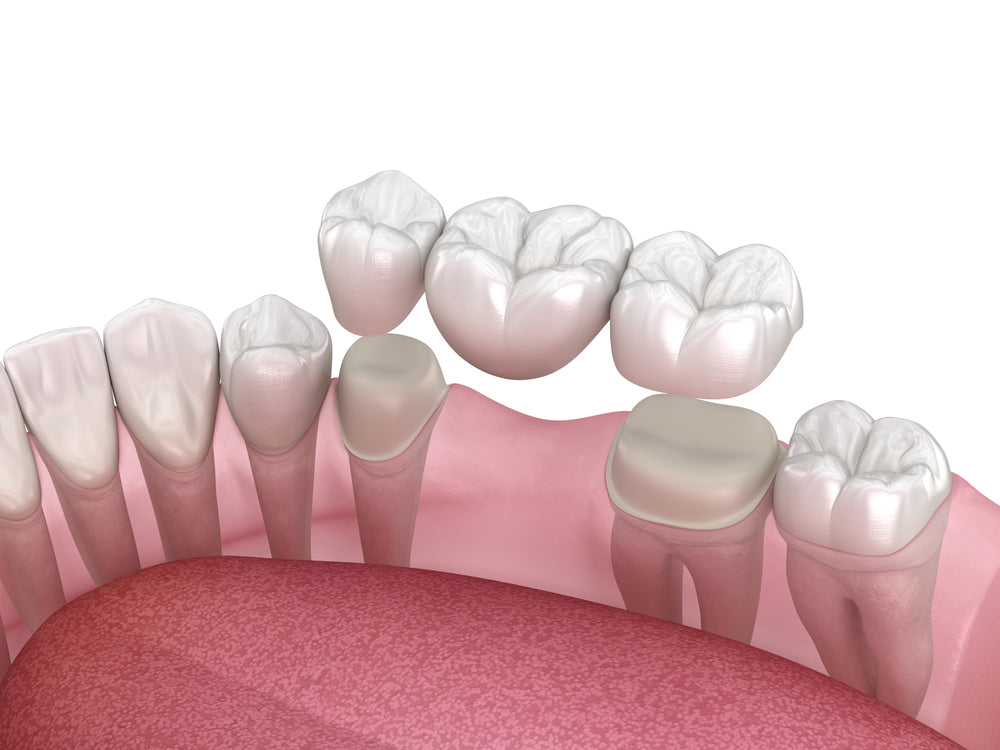
Dental Implant Vs Dental Bridge – Which One Is Right for You
|
Time to read 6 min
|
Time to read 6 min
Are you looking to get dental implants? That's great, but what do you need to know about implants before you get them?
A missing tooth can reduce your self-confidence and opens the door to infection, therefore, it's a wise option to fill the gaps to not only improve your aesthetics but your health as well.
Dentistry has come a long way and there are many effective solutions. Dental implants and dental bridges are two of the most common options for replacing missing or damaged teeth. While both options can restore your smile and improve your oral health, they have some differences that may make one a better choice for you than the other.
Here we'll provide you with what you should know about dental bridges and dental implants to help you decide which alternative is right for you.
Dental implants are a permanent solution for replacing missing teeth. They consist of a small titanium post that is surgically placed into your jawbone which acts as a replacement for your tooth's root. The post is then topped with an abutment (an abutment is simply something which fixes or connects that new “tooth” in place, it keeps it secure) which connects to a prosthetic tooth (or teeth) that is custom-made to match your existing teeth.
The process of getting a dental implant typically involves several appointments over the course of several months. Early on in your appointments, your dentist or oral surgeon will place the post into your jawbone. After a period of healing (which can take several weeks to several months), you will return to have the abutment attached to the post. Often, your dentist or surgeon will need to add some kind of element to strengthen the bone where the implant will be place, as it needs a secure connection. Finally, your prosthetic tooth will be attached to the abutment, completing the process.
What Are Dental Bridges?
Dental bridges are a non-surgical solution for replacing missing teeth. They consist of one or more prosthetic teeth that are anchored to the remaining natural teeth on either side of the gap left by the missing tooth (or teeth).
If there's a gap in a tooth between two healthy teeth, a dental bridge could be an ideal option to bridge the gap. In the beginning, the dentist will remove a few parts of the adjacent teeth in order to make space for crowns. The dentist will then take impressions of the teeth, and crowns will be designed. The dentist will then glue the crowns before placing the bridge and adjust it to ensure that it fits perfectly. The porcelain bridge placed will have a similar shade to your natural teeth to help the bridge blend in seamlessly to your mouth. One thing to note, however, is that brushing and flossing may become difficult due to the way your new tooth is placed. If you keep up with your oral hygiene regime with our recommended product s and follow the instructions of your dentist, however, you should be able to keep your bridge in place for at least 10 years.
What Causes Tooth Loss?
Tooth loss can occur due to various reasons. Some of the most common causes of tooth loss are:
Discover More: Are Your Teeth Bones | What Are Teeth Made Out Of | Teeth Vs Bone
What Are Some Differences Between a Dental Bridge and an Implant?
If you're still not quite sure what the differences between a dental bridge and an implant are, these pros and cons will hopefully give you a better idea about the downsides and benefits to both.
Dental Implants:
Pros:
Cons:
Dental Bridges:
Pros:
Cons:
Effective bad breath remedies include:
Gentle and regular scraping of the tongue
Regular oral care practices such as daily brushing and flossing
Professional deep cleanings and plaque removal
The ongoing use of oral probiotics.
One, the probiotics compete with the existing bad bacteria and reduce their presence by “crowding them out”
Two, the probiotics produce BLIS or “bacteriocin-like-inhibitory-substances” which is a technical way of stating that one probiotic strain (bacteria) can produce a substance that inhibits or kills off other bacteria. Three, by working to control gingivitis, gum disease and tooth decay these probiotics reduce the very sources of bacteria-generated odors in the mouth.
Studies have shown a clear reduction in plaque levels and gingivitis symptoms when oral probiotics were administered to patients with moderate to severe gingivitis.


